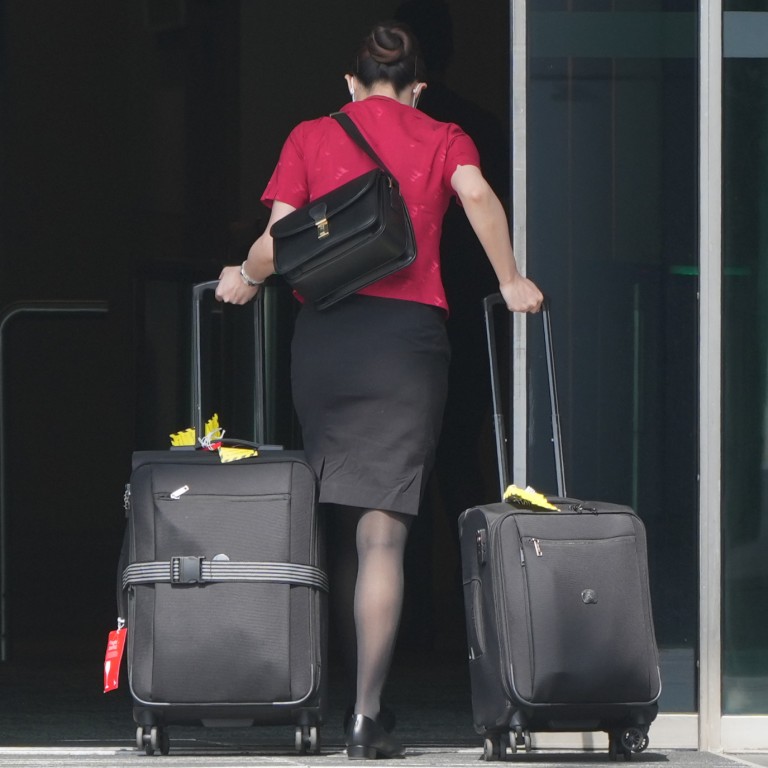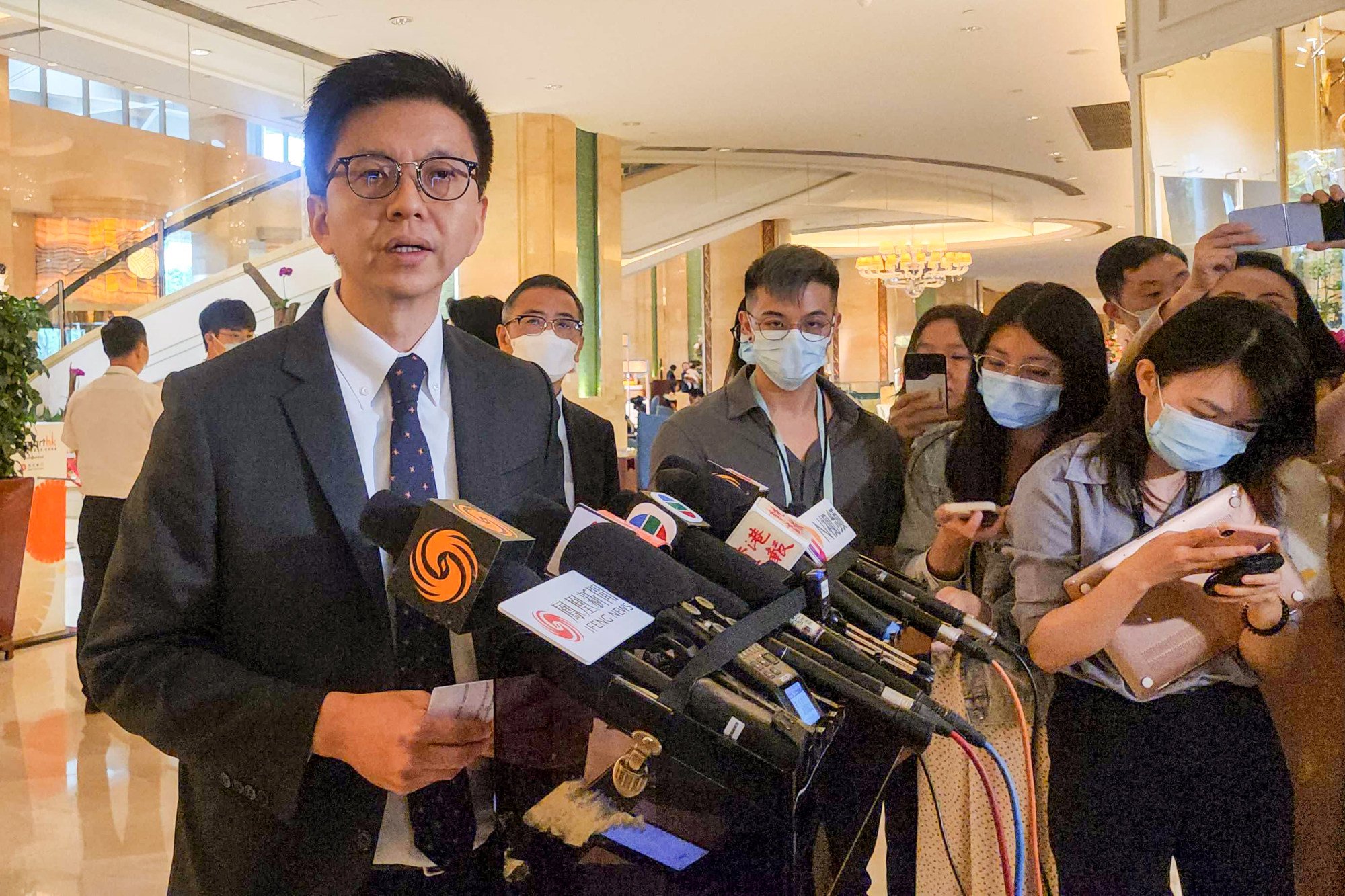
Cathay Pacific discrimination scandal: Hong Kong’s flag carrier has work cut out to fix image but bosses must reflect on own role and not forget staff, PR experts say
- Scandal-hit airline’s bosses must also reflect on their role and not just suggest current woes are about proper training, public relations experts say
- Staff should feel they are proud ambassadors of company rather than just mere employees, they say
It had to create a corporate culture that should permeate throughout the organisation that everyone was conscious of the brand they stood for, they said.
Flight risk: unpacking pilot grievances at Hong Kong’s Cathay Pacific
Cathay was rocked by scandal after a Mandarin-speaking passenger accused three flight attendants of mocking customers’ English-language abilities on a flight from Chengdu to Hong Kong on Sunday.
The passenger posted voice recordings on mainland social media platform Xiaohongshu on Monday of a conversation between the flight attendants, in which one said: “If you cannot say ‘blanket’, you cannot have it.”
Cathay’s social media accounts have been flooded with comments, mostly from angry mainland users, disparaging its service standards.
Less than 48 hours after reports of the incident emerged, CEO Ronald Lam Siu-por announced on Tuesday evening that the three crew members had been fired and he vowed to establish a cross-departmental task force to improve the company’s culture of “customers first”.

On Wednesday, he also apologised in Mandarin to affected passengers and the public, the company’s fourth expression of regret in three days.
In an internal memo sent to all staff on Thursday, Lam said the incident reflected “something much deeper which we need to address”, and that the airline “must reflect humbly, examine our culture deeply and take concrete measures” to turn its image around.
Kaman Lee, an associate professor from Chinese University’s school of journalism and communication who studies crisis management, on Friday said the scandal showed that more than one issue was troubling the company.
“It’s not a public relations problem. It’s a corporate problem,” Lee said, noting that Cathay’s image and reputation had worsened in recent years.
Hong Kong’s Cathay Pacific discrimination scandal: why did aircrew behave so badly?
Instead of just focusing on whether frontline employees had received training, Lee said, the company should look into why staff could not deliver a professional service.
“Why did such an unprofessional incident happen? Did it involve a lot of factors?” she said. “Is it a recruitment issue … or why can’t we train people well?”
Lee added: “Management needs to let the staff feel that they are respected and there are support channels for them. Whether we need to improve employees’ treatment, in terms of salary and benefits … and how to let staff work without concerns.”
She noted these were factors that contributed to better staff performance.
“If a company failed to get their employees to willingly be an ambassador [for the firm], then it must indicate some problems,” she said.
To improve it public image, Cathay should also be consistent in handling crises and complaints, in terms of efficiency and transparency in follow-up procedures, she said.

Rudi Leung Chi-sing, director of local advertising agency Hungry Digital, said the debacle showed that it did not matter how much the airline invested in advertising if little effort was put into its staff.
Cathay might have been “too apologetic” in its response, which could “heavily impact” on internal morale, Leung said.
“All we know for sure is what happened in the voice recording, we have no idea about what happened in between, such as the interactions with the customers and the emotions involved,” he said.
“When dealing with this matter, Cathay Pacific has simply knelt down, which shows that it has not considered the staff’s morale.”
Leung said as it was impossible for the airline to stop the flood of internet complaints, the company should stay level-headed and directly deal with the customers involved.
“China is a huge country, you will not be able to deal with all public opinion,” he said. “If people are unsatisfied, it is useless to make three extra apologies. It can be endless.”
Cathay to step up efforts to rescue reputation, will ‘humbly reflect’ on scandal
He added that to salvage its reputation, the airline could only “walk the talk” by showing its flight attendants were respectful to passengers from different countries.
From a management point of view, executives should always get hold of the situation before assigning blame right away, Leung said.
Andrew Yuen Chi-lok of Chinese University’s Aviation Policy and Research Centre said Cathay’s response was “prompt and effective” in terms of damage control, but there were issues that had to be addressed properly in the long run.
“First, Cathay Pacific is required to rebuild its image in mainland China and gain back trust from the customers there. Second, in addition to reviewing its service protocols and training process, it is more important to strengthen its customer-centric corporate culture,” he said.
“Third, it is also important for the leadership to raise staff morale and unite staff at different levels to move ahead.”
Yuen said a decline in service quality in the global aviation industry had been observed after the pandemic because of labour shortages.
“Given the tough situation, building a collaborative and mutual respect workplace for the staff becomes crucial,” he said.
Hong Kong equality watchdog warns Cathay staff may have breached discrimination law
Meanwhile, Andy*, a Cathay flight attendant for eight years, said he and his colleagues felt the airline’s handling of the incident was too “abrupt” and “extreme”.
“Even if it is just an act, [management] can spend more time investigating so people will know they did try to understand the situation and the people involved,” he said.
“Everything happened too fast. It gives people a feeling they were trying to make an example of the flight attendants and swiftly put an end to the scandal.”
He said morale among his colleagues had become poorer since the scandal and some of them were even “scared” to go to work.
“They are afraid that they will say the wrong things and be recorded, and suddenly be fired,” he said. “It feels like we are unprotected and can be fired and replaced easily.”
There was unease even talking among colleagues for fear that someone could record the conversation, he added, expressing concern that the situation might trigger a wave of resignations.

Andy said the ability to speak Mandarin was not required for all flight attendants as some were not Chinese, but he believed the airline might provide optional training in the language in future.
He said when serving passengers who looked Asian, it was common practice for Cathay flight attendants to speak English before using other languages and observe their reactions.
“If I speak Mandarin with a Japanese passenger, it may also count as discrimination,” he said.
But Andy noted that it also depended on flight attendants’ personal experience when speaking in different languages as some might be able to differentiate passengers from various countries after years of service.
Hong Kong’s Cathay Pacific tries to defuse insult scandal as union blasts management
Cathay’s cabin crew union on Wednesday expressed regret over the incident but said morale was at an all-time low, with the airline facing a manpower shortfall despite an increased workload and reduced pay.
The union also urged the company to address the cause of the problem and rebuild a reasonable and safe work environment to improve staff morale.
But the carrier on Thursday issued a statement saying the company did not condone, support or agree with the union’s position on the matter.
*Name changed at interviewee’s request.


